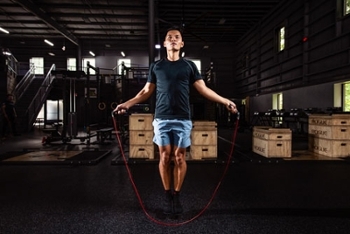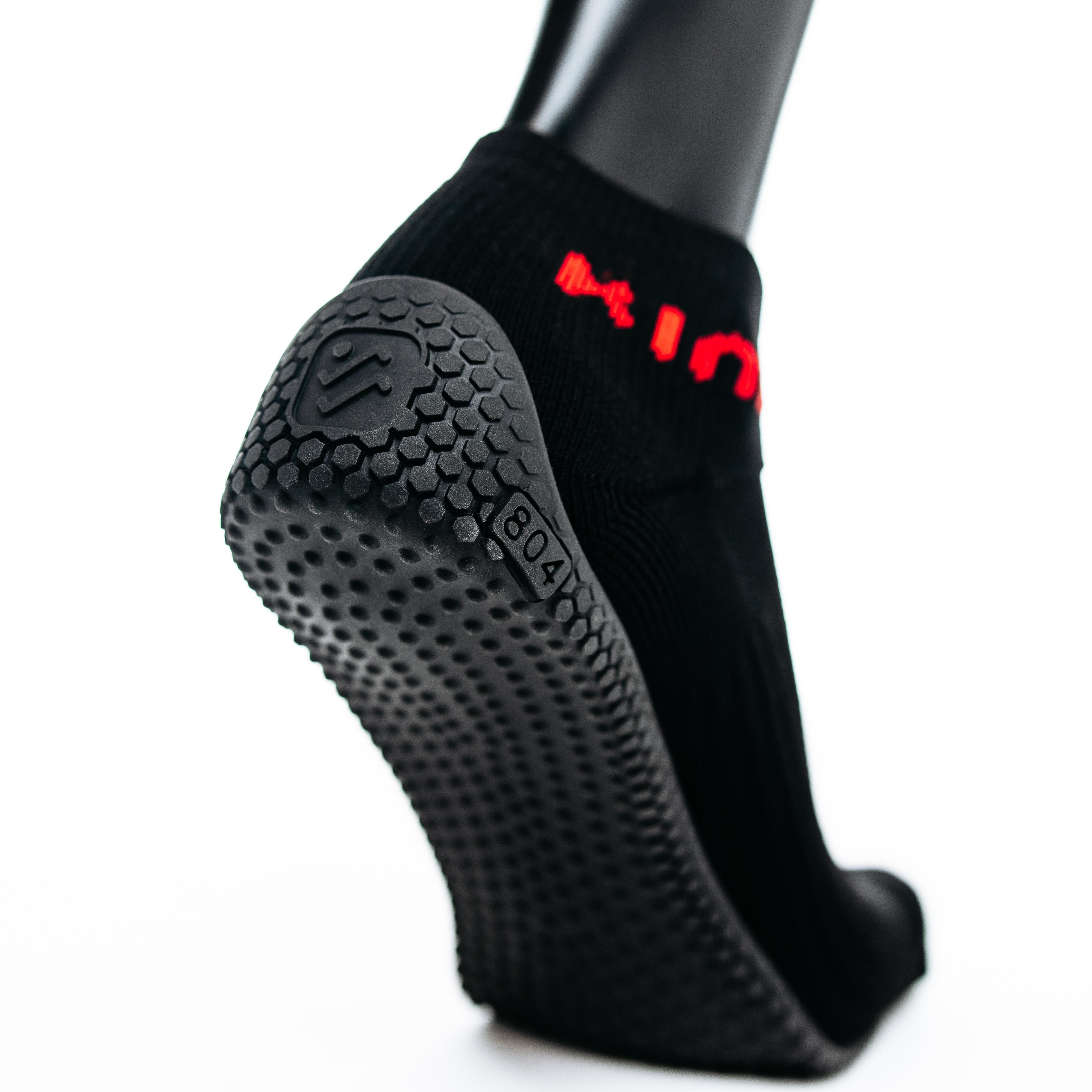Treading a Path to Success: Back to Basics
Recent Online MBA graduate, Vincent Vu, knows what it takes to build a business from the ground-up. Seldom does one have the privilege of meeting a nascent entrepreneur. It is generally after a person has made it big that we hear the backstory of his or her humble beginnings. Vincent lives his story. As the creator of KINIS, a start-up business focused on appropriate, minimalistic footwear for proper exercising, Vincent conceptualized his product as a boy. He may not have realized it at the time, but as a kid running shoeless in a refugee camp for six years, his childhood environment not only sculpted his body but his ambitions as well.
Born in Vietnam, his mother and younger brother fled the country in 1990. Vincent remembers being pulled out of school at seven years old. They were part of a “wave of immigrants who escaped the country illegally on fishing boats late at night.” The family hoped to leave behind the persecution they’d experienced after Vincent’s grandfather fought with the United States-allied South Vietnamese army in the Vietnam War. They were among the more than 800,000 refugees known as “boat people” who left Vietnam in the two decades after the war’s culmination. Vincent’s father stayed in Vietnam. He had helped to pay for his family’s precarious voyage. Neither Vincent nor his brother, who was three at the time, were told where they were going or why. The typical fishing boat was designed to hold approximately 15 people. 165 were crammed below deck with many experiencing nausea and vomiting. “They were city people, many of them, and had never been on a boat. They were throwing up everywhere. For some reason my brother and I were fine. I remember we ate this fruit and it hydrated us. We would just chew on it as the boat took us southward.” Eventually they were picked up by a commercial cargo ship from Holland. The fishing boat was strategically destroyed. Vincent’s family was then deposited on an island belonging to Indonesia. Vincent’s mother applied for official refugee status and resettlement through the United Nations. Missing some required documents, the interview was unsuccessful. As a result, the family remained in the Galang Refugee Camp.
As a boy, Vincent played soccer with a balled-up plastic bag, running shoeless throughout the camp. “I spent a lot of time outdoors. Walked for miles. We were mostly homeschooled at that point, but we had a tutor who would come to teach us math.”
After six years, Vincent’s mother again applied for asylum. The family was sent back to Vietnam. Vincent’s parents divorced. Two years later, in 1998, his mother was approved and they immigrated to Sioux City, Iowa, where Vincent’s maternal uncle was already living. He vividly recalls how cold it was that April. “My first job in the U.S. I worked in a cornfield. It was hard work. Long hours. I also went to summer school.” Vincent’s family stayed for a year before moving to Richmond, Virginia, where he graduated from J.R. Tucker High School. He then worked to put himself through the Savannah College of Art and Design, earning a master’s degree in architecture. Vincent is an engineer at heart.
In 2011, Vincent read the bestseller “Born to Run” by Christopher McDougall, which details how “the Tarahumara Indians in Mexico developed the ability to run hundreds of miles in simple sandals. The book popularized the minimalist running movement, which advocates wearing thin-soled, lightweight shoes.”
Inspired by the story, and as an athlete who was experiencing pain and seeking a long-term remedy, Vincent began researching and designing what would eventually become a “sock-shoe.”
"I wanted it to work with the natural design of the body. The foot is an amazing feat of engineering which has evolved over time. I wanted to bring it back to the basics."
Vincent can often be seen walking around the Startup Virginia business incubator in downtown Richmond. At a casual glance, he appears to be sporting black socks with no shoes. But things aren’t always what they seem. The black sock, made of highly durable material, has a super thin sole, barely perceptible unless a passerby takes the time to look twice. In the very beginning Vincent taped foam, purchased from Michaels Arts and Crafts, to his socks and went to the gym to try out the feel. “I got a lot of strange looks,” he laughs. This was when the idea really started to take hold.
The “socks” are a special kind of footwear, a hybrid between socks and shoes which Vincent, an avid athlete, designed to help alleviate the foot and knee pain he once suffered during his exercise routines. “I have been a [quasi] barefoot trainer for almost three years now. My workouts include gym training and some running. Physically, my feet are much stronger. All the pain I was having before went away on its own.”
At 36, Vincent founded the company known as KINIS. After months upon months of research, hours of trial and error in his garage, he gradually came closer to a workable prototype.
What he gained through failed attempts was invaluable knowledge about his product. Every material used he investigated at length.
At one point he dipped into his 401K and made a $20,000 investment in a machine that would enable him to mold the base to the sock. Unfortunately, the heat was too hot for the fabric; however, the temperature had to be hot enough for the tread to adhere and cool properly. It sounds simple, but the reality was hours of solitary work and tenacity, while supporting a family, much like Edison who kept at it with the lightbulb in his workhouse. Working with a North Carolina knitting mill and a crazy looking apparatus machine in his garage, Vincent continued to test prototypes. Eventually he sold his machine and bridged relations with a company in China. The rubber base was so strong that it broke the manufacturer’s needle. They called to tell him they had to stop production. Vincent didn’t give up or let this setback derail him. A special needle had to be designed. Once production resumed, Vincent officially launched his business. He began manufacturing KINIS footwear in China and moved into the office at Startup Virginia, a nonprofit for entrepreneurs located on East Cary Street, Richmond. Startup Virginia has enabled Vincent to spread awareness about his product with its network of 200-plus mentors. Vincent met Marc Oosterhuis, a retired marketing executive who became an advocate of his footwear and an investor in the company.
The barefoot-like athletic footwear, which Vincent calls Nomad 804, is made of breathable and machine-washable Honeywell Spectra Fiber, with a thin, flexible and grip-equipped sole. The Nomad 804 is designed for indoor wear and exercise. The “un-shoe” is intended to help wearers improve their balance and feel the ground. “It’s natural to be connected to the earth, to be connected to your body again,” Vincent explains.
One may be curious about the origin of the name KINIS. It is derived from the term ‘kinesiology’ which, by definition, is the study of the mechanics of body movement. A better name couldn’t be had.
KINIS combines Vincent's passion for engineering, designing and his appreciation for the mechanics of the human form.
The mission statement of KINIS is to “design and manufacture the ultimate barefoot training footwear to help people build stronger feet.” Thus far, the proof is in the pudding. Slip on a pair of KINIS “un-shoes” and you will soon discover their benefits. They roll up, are lightweight, can be worn through security at the airport and truly enable balance. Offering necessary protection, the wearer still feels the contours of the ground and that primordial connection, without going completely rogue as a barefoot enthusiast.
Vincent stresses that, unlike big brand names such as Nike, he’s grounded in truly benefiting the athlete. It’s not about creating a gimmick or something trendy. “You can create something for the sake of marketing or engineer something to last. Why reinvent the wheel every year? I want to take this back to basics.” Enough with colors and arch support and theories. Hundreds of years ago, if even, humans were far more robust.
The body has softened over time and the natural, breathable movement of our feet has been blunted by the constriction of shoes.
“If you build a house on a shaky foundation, it’s a matter of time before something happens, but if you build a strong foundation through your feet, you’ll maintain stability and properly support your body.”
How did Vincent find time to earn his MBA? “The last two years have been stressful. Sixteen-hour days. I work full-time, go to school, and in my spare time I do this,” he holds up the KINIS box, which, by the way, is eco-friendly.
"The Online MBA program taught me strategic thinking and reinforced having a long-term vision. You learn how to compete with companies when you have zero money."
The program instills how to position yourself to be successful with branding, marketing and telling your story. Vincent says, “You have to identify your consumer and ask the right questions. I appreciated the small class size and dedication, the passion of the professors. I wouldn’t be where I am today without the lessons learned from the program and the feedback of Professor Graham Henshaw.”
Full-time, Vincent is an engineer. He is also a husband and father. From a refugee camp, to a corn field in Iowa, to a garage in Richmond, Vincent knows success is truly a labor of love. “The technology of the product is meant to inform us about how we should move. It is also preventative. As we age our bodies degenerate. It is important to move properly. This way we can prevent issues and live actively, having more time to spend with our families.” Right now, the Nomad 804 is a low-tech very effective footwear. The next model will incorporate a tracking system that logs cadence, posture, alignment, weight distribution and ankle mobility. There will be an app linked to the sensory-lined sock-shoe, enabling wearers to track their progress. As a go-getter who demonstrates initiative, tenacity and the importance of maintaining core values, Vincent Vu would like to see KINIS become Richmond’s brand name.